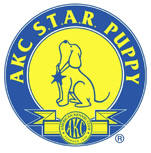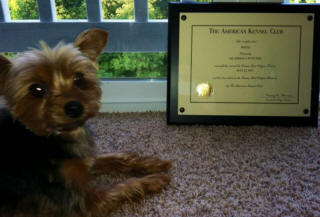
AKC's "CGC"

Precision K-9 Services offers, AKC Canine Good Citizen (CGC) Testing

Some therapy dog groups require passing the CGC Test
as a prerequisite, some insurance companies
recommend CGC training, and an increasing number
of apartments and condos are requiring CGC training
for resident dogs.
It's a good idea, and it sure won't hurt to do one!
"CGC" is now an AKC official TITLE, and will be shown on your dogs AKC title record !!!!!!
We also offer Prep classes, this prepares you for the Test, just in case you need just a little extra work on one or two of the exercises that are required in the testing.
We offer a discounted price on testing and prep classes for customers who take our Basic and/or Advanced classes before their CGC Testing.
_________________________________________________________________
The AKC’s Canine Good Citizen Program is designed to recognize dogs who have good manners at home and in the community. This rapidly growing nationally recognized program stresses responsible dog ownership for owners and basic training and good manners for dogs.
All dogs who pass the 10 step CGC test may receive a
certificate from the American Kennel Club.

(Rocco with his certificate! Precision K-9 Trained and Certified)
AKC CANINE GOOD
CITIZEN TEST

The CGC TEST consists of 10 skills needed by all
well-mannered dogs.The CGC TEST consists of 10 skills needed by all
well-mannered dogs.
All of the exercises are done on a leash.
Test 1: Accepting a
friendly stranger
The dog will allow a friendly stranger to approach it
and speak to the
handler in a natural, everyday situation.
Test 2: Sitting
politely for petting
The dog will allow a friendly stranger to pet it while
it is out with its
handler.
Test 3: Appearance
and grooming
The dog will welcome being groomed and examined and
will permit
someone, such as a veterinarian, groomer or friend of
the owner, to do so.
Test 4: Out for a
walk (walking on a loose lead)
The handler/dog team will take a short “walk” to show
that the dog is in
control while walking on a leash.
Test 5: Walking
through a crowd
The dog and handler walk around and pass close to
several people (at least
three) to demonstrate that the dog can move about
politely in pedestrian
traffic and is under control in public places.
Test 6: Sit and down
on command and Staying in place
The dog will respond to the handler’s commands to 1)
sit, 2) down
and will 3) remain in the place commanded by the
handler (sit or down
position, whichever the handler prefers).
Test 7: Coming when
called
The dog will come when called by the handler. The
handler will walk
10 feet from the dog, turn to face the dog, and call
the dog.
Test 8: Reaction to
another dog
To demonstrate that the dog can behave politely around
other dogs,
two handlers and their dogs approach each other from a
distance of about
20 feet, stop, shake hands and exchange pleasantries,
and continue on for
about 10 feet.
Test 9: Reaction to
distraction
To demonstrate the dog is confident when faced with
common distracting
situations, the evaluator will select and present two
distractions. Examples
of distractions include dropping a chair, rolling a
crate dolly past the dog,
having a jogger run in front of the dog, or dropping a
crutch or cane.
Test 10: Supervised
separation
This test demonstrates that a dog can be left with a
trusted person, if
necessary, and will maintain training and good
manners. Evaluators are
encouraged to say something like, “Would you like me
to watch your
dog?” and then take hold of the dog’s leash. The owner
will go out of sight
for three minutes.
All tests must be performed on leash. For collars, dogs should wear well-fitting buckle or slip collars. Martingale style (sometimes called "limited slip") collars are permitted. Special training collars such as pinch collars, head halters, and electronic collars are not permitted in the CGC test.
As of November 4, 2010, body harnesses may be used in the CGC test. The evaluator should check to make sure the harness is not of a type that completely restricts the dog's movement such that it could not pull or jump up if it tried.
We recognize that special training equipment such as head collars and no-jump harnesses may be very useful tools for beginning dog trainers, however, we feel that dogs are ready to take the CGC test at the point at which they are transitioned to equipment that allows the evaluator to see that the dog has been trained.
The evaluator supplies a 20-foot lead for the test. The owner/handler should bring the dog's brush or comb to the test.
The above was taken from AKC's website.
Click to enlarge CGC Evaluator Certificate
CGC Prep Class (with purchase of Basic or Advanced) (may need more than one) $50.00
CGC Testing (with purchase of Basic) $60.00
CGC Testing (with purchase of Advanced) $50.00
See all Class Pricing HERE